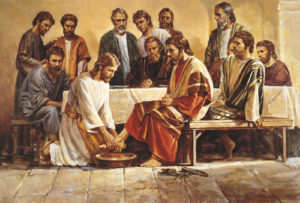A Christian Conclusion
 There might be a reason why it seems members of The Church of Jesus Christ of Latter-day Saints don’t spend much time on the question: Are Mormons Christian? Perhaps it’s because it feels like an obvious conclusion. A straightforward definition of Christianity is believing Jesus Christ to be our Savior and Redeemer. And we do. With that, the discussion seems over. However, even as a child, I remember being challenged on this topic by classmates, and as an adult, it still comes up. It made no sense to me how a church called The Church of Jesus Christ of Latter-day Saints could be seen as anything but Christian. Yet in the meantime, I’ve learned that there are some Christians who have a more specific definition of Christianity, and that is where we might diverge. Here are the important basics:
There might be a reason why it seems members of The Church of Jesus Christ of Latter-day Saints don’t spend much time on the question: Are Mormons Christian? Perhaps it’s because it feels like an obvious conclusion. A straightforward definition of Christianity is believing Jesus Christ to be our Savior and Redeemer. And we do. With that, the discussion seems over. However, even as a child, I remember being challenged on this topic by classmates, and as an adult, it still comes up. It made no sense to me how a church called The Church of Jesus Christ of Latter-day Saints could be seen as anything but Christian. Yet in the meantime, I’ve learned that there are some Christians who have a more specific definition of Christianity, and that is where we might diverge. Here are the important basics:
- Latter-day Saints do not accept the creeds, confessions, and formulations of post–New Testament Christianity.
- The Church of Jesus Christ of Latter-day Saints does not descend through the historical line of traditional Christianity. That is, Latter-day Saints are not Roman Catholic, Eastern Orthodox, or Protestant.
- Latter-day Saints do not believe scripture consists of the Holy Bible alone but have an expanded canon of scripture that includes the Book of Mormon, the Doctrine and Covenants, and the Pearl of Great Price.
In unequivocal terms, we as members of the church assert belief in God, our eternal Father, his son Jesus Christ, and in the Holy Ghost. Some creeds call for a belief in the Holy Trinity, where it is understood that all three are without form and are one. We do not believe in a trinity. From there, other distinctions include adoption of the Nicene creed and the belief that all prophets and revelation from God are contained in, and do not extend beyond, the Bible. However, we believe The Book of Mormon to be the word of God, and is a book of scripture written by prophets about the coming of the Savior. We also believe in modern prophets and subscribe wholeheartedly to continuing revelation.
What does this mean to members of the church? We might understand a bit better why some say we aren’t Christian. It doesn’t mean we agree. For we are. Religious scholars, citing the above differences may say that members of The Church of Jesus Christ of Latter-day Saints are not part of traditional, reformist or historical Christian sects. Scholars recognize, however, they’re referencing the creeds, reformist histories, and closed canon type of Christianity when they do. But when said in front of, and repeated by, the average lay person, this can bring confusion. With the simple definition of Christianity as belief in Jesus Christ, we as members of the restored church of Jesus Christ find that we are still answering the question that never seemed germane.
There is a lot to be said for the simplest approach being the best approach. Truly, if we as a group asserted that Christians are people who believe in and follow Jesus Christ, instead of overanalyzing semantics, we have room to grow together. As is evidenced by the multitude of Christian religions, the interpretation of doctrine varies. But does that matter? For as Jesus said, “be one, and if ye are not one ye are not mine.” What would happen if we embraced all whom declare themselves to be followers of Jesus, and included each other in Christian conversation?
Perhaps if I had the panache to eloquently converse with the early naysayers in my life, or even the current ones, I could simplify the discussion with my emphatic witness that I believe in and follow my Savior Jesus Christ. I’m humbled by his life of service and the sinless sacrifice that he offered for our eternal benefit. I rejoice in his resurrection and the hope of his Second Coming. Despite the doctrinal details where we differ, our hope is that, as disciples of Christ, we can come together in the virtuous application of a Christian life.

